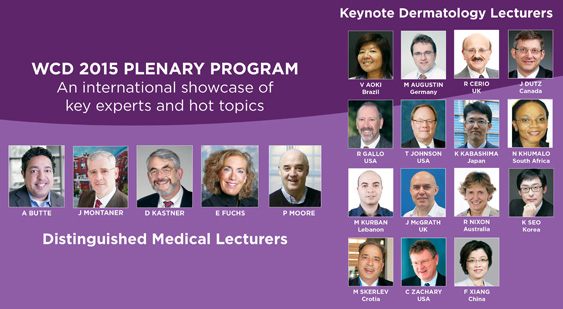WCD 2015 Distinguished Lectureships: Global experts discuss important medical and scientific issues relevant to dermatology.
WCD 2015 Keynote Lectureships: Leading dermatologists from around the world present state-of-the-art lectures on hot topics.
Tuesday, June 9, 10:30 – 12:30
- The Bioinformatics Revolution in Medicine, Atul Butte (USA) (30 minute presentation)
Keynote Lecturers (20 minute presentation each):
- Exciting Discoveries in Genodermatoses, John McGrath (GBR)
- How Do We Prove the Value of Dermatologic Care?, Matthias Augustin (DEU)
- Multiphoton Skin Imaging, Kenji Kabashima (JPN)
Wednesday, June 10, 10:30 – 12:30
- HIV – Treatment as Prevention, Julio Montaner (CAN) (30 minute presentation)
Keynote Lecturers (20 minute presentation each):
- Hair Disorders and Ethnicity, Nonhlanhla Khumalo (ZAF)
- New Stories from the Pemphigus Family, Valeria Aoki (BRA)
- Recent Advances in Antimicrobial Peptides, Richard Gallo (USA)
Thursday, June 11, 10:30 – 12:30
- Autoinflammatory Syndromes and the Skin, Daniel Kastner (USA) (30 minute presentation)
Keynote Lecturers (20 minute presentation each):
- New Surgical Concepts that Every Dermatologist Needs to Know, Chris Zachary (USA)
- Sexually Transmitted Infections: Important Global Trends, Mihael Skerlev (HRV)
- What’s New in Vitiligo?, Flora Xiang (CHN)
Friday, June 12, 10:30 – 12:30
- Stem Cells in Dermatology, Elaine Fuchs (USA) (30 minute presentation)
Keynote Lecturers (20 minute presentation each):
- What’s Hot in Cosmetic Dermatology?, Kyle K. Seo (KOR)
- Melanoma Sentinel Node Biopsy: Past, Present and Future in the New Era of Systemic Therapies, Tim Johnson (USA)
- Updated Concepts and Dilemmas in Dermatopathology, Rino Cerio (GBR)
Saturday, June 13, 10:30 – 12:30
- Skin Cancers and Viruses: Lessons from Kaposi’s sarcoma and Merkel cell carcinoma, Patrick Moore (USA) (30 minute presentation)
Keynote Lecturers (20 minute presentation each):
- The World of Contact Dermatitis in 2015, Adriene Lee (AUS) presenting on behalf of Rosemary Nixon (AUS)
- Using the Skin to Influence Systemic Immunity, Jan Dutz (CAN)
- Insights from Genetic Hair and Nail Disorders, Mazen Kurban (LBN)
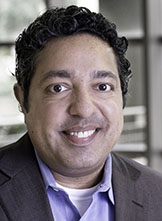 |
Atul Butte, MD, PhD Director, Institute for Computational Health Sciences, University of California, San Francisco (United States) Presentation: The Bioinformatics Revolution in Medicine
|
Atul Butte, MD, PhD is the new Director of the new Institute of Computational Health Sciences (ICHS) at the University of California, San Francisco, and a Professor of Pediatrics. Dr. Butte trained in Computer Science at Brown University, worked as a software engineer at Apple and Microsoft, received his MD at Brown University, trained in Pediatrics and Pediatric Endocrinology at Children’s Hospital Boston, then received his PhD from Harvard Medical School and MIT. Dr. Butte has authored nearly 200 publications, with research repeatedly featured in Wired Magazine, the New York Times, and the Wall Street Journal. In 2013, Dr. Butte was recognized by the White House as an Open Science Champion of Change for promoting science through publicly available data. Dr. Butte is also the principal investigator of ImmPort, the clinical and molecular data repository for the National Institute of Allergy and Infectious Diseases.
 |
Elaine Fuchs, PhD Laboratory of Mammalian Cell Biology and Development, Rockefeller University (United States) Presentation: Stem Cells in Dermatology
|
Elaine Fuchs is the Rebecca Lancefield Professor in Mammalian Cell Biology and Development at The Rockefeller University. She is also an Investigator, Howard Hughes Medical Institute. Fuchs has published >290 papers and is internationally known for her research in skin biology, its stem cells and its associated human genetic disorders, which include skin cancers. Fuchs’ pioneered “reverse genetics,” a method of starting with protein and working one’s way up to elucidating the genetic basis of the human disorder that is caused by its mutations. Fuchs’ current research focuses on the molecular mechanisms underlying how skin stem cells self-renew, maintain and regenerate the epidermis, sweat glands and hair follicles.
Fuchs received her Ph.D. in Biochemistry from Princeton University. After postdoctoral research with Dr. Howard Green at MIT, she joined the faculty at the University of Chicago. She stayed from 1980-2002 until relocating to The Rockefeller University. Fuchs’ is the recipient of the Presidential Young Investigator Award, NAS Richard Lounsbery Award, Novartis-Drew Award, Dickson Prize, FASEB Award for Scientific Excellence, Beering Award, National Medal of Science, L’Oreal-UNESCO Award, Madison Medal, Passano Award, Albany Prize in Medicine (with Shinya Yamanaka and James Thompson), March of Dimes Prize in Developmental Biology (with Howard Green), New York Academy of Medicine Medal, Kligman-Frost Leadership Award (Society of Investigative Dermatology), Lifetime Achievement Award (American Skin Foundation) and Pasarow Award for Cancer Research. Fuchs is an elected member of the National Academy of Sciences, Institute of Medicine, American Academy of Arts and Sciences, American Philosophical Society, European Molecular Biology Organization (foreign member) and Academy of the American Association for Cancer Research. She holds honorary doctorates from Mt. Sinai/New York University School of Medicine and from University of Illinois. Fuchs is also past President of American Society of Cell Biology, and International Society for Stem Cell Research. She serves on the Board of Governors of the New York Academy of Sciences. She has trained over 25 graduate students and 100 postdoctoral fellows.
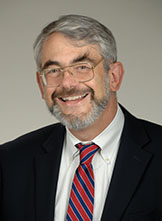 |
Daniel Kastner, MD, PhD Division of Intramural Research, National Human Genome Research Institute (United States) Presentation: Autoinflammatory Syndromes and the Skin
|
Dr. Dan Kastner obtained his A.B. summa cum laude in philosophy from Princeton University and an M.D. and Ph.D. from Baylor College of Medicine. After completing an Internal Medicine residency and chief residency at Baylor, Dr. Kastner moved to the NIH in 1985 as a Rheumatology fellow. He became a tenure track investigator in the National Institute of Arthritis and Musculoskeletal and Skin Diseases (NIAMS) in 1990, attained tenure in 1995, was named Chief of the Genetics and Genomics Branch in 2001, and was Clinical Director of NIAMS from 2005 to 2010. He is currently the Scientific Director of the Division of Intramural Research of the National Human Genome Research Institute (NHGRI).
Based on a chance encounter with a patient with familial Mediterranean fever (FMF), Dr. Kastner has studied genetic disorders of inflammation at the NIH for over 20 years. In 1992 his lab mapped the gene for FMF to chromosome 16p and subsequently identified the recessively inherited gene by positional cloning. This gene encodes what was then a novel protein (pyrin) that is the prototype for a motif found in 20 human proteins, several involved in inflammation. Prompted by an Irish patient with an FMF-like illness, Dr. Kastner’s lab discovered that mutations in the p55 TNF receptor cause a dominantly inherited condition they named TRAPS (the TNF receptor-associated periodic syndrome). Stimulated by other patients, Dr. Kastner’s lab has made seminal genetic discoveries that establish three other distinct illnesses as disorders of the IL-1 pathway, thus helping to define the role of IL-1 in human biology and establishing IL-1 inhibitors as effective therapy. More recently his laboratory has utilized genomic approaches in genetically complex disorders, such as rheumatoid arthritis, Behçet’s disease, and systemic-onset juvenile idiopathic arthritis. Dr. Kastner’s group also proposed the now widely accepted concept of autoinflammatory disease to denote disorders of innate immunity.
Dr. Kastner has won a number of awards and honors. In 2010 he was elected to the National Academy of Sciences, and in 2012 he was elected to the Institute of Medicine of the National Academies.
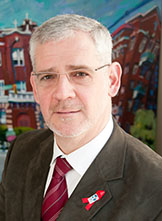 |
Julio Montaner, MD, FRCPC, FCCP BC Centre for Excellence in HIV/AIDS, St. Paul’s Hospital (Canada) Presentation: HIV – Treatment as Prevention
|
Dr. Julio Montaner is originally from Buenos Aires, Argentina. He received his Medical Degree with Honors from the University of Buenos Aires in 1979. In 1981, Dr. Montaner joined the University of British Columbia (UBC) at St. Paul’s Hospital (SPH) where he completed his training in Internal Medicine and Respiratory Medicine. While still in training, he led several clinical studies that demonstrated the role of adjunctive corticosteroids in PCP-related respiratory failure. In 1988, he became the Director of the AIDS Research Program and the Immunodeficiency Clinic at SPH/UBC. Since then, he focused his research in the development of antiretroviral therapies and management strategies. In the mid 90’s, he played a key role in establishing the efficacy of NNRTI based highly active antiretroviral therapy (HAART). This was one of the pivotal contributions emerging from the IAS-sponsored Vancouver 1996 International AIDS Conference, of which he was a co-organizer. He is a Professor of Medicine at UBC and has held the Endowed Chair in AIDS Research at SPH/UBC since 1996. He is a founding Co-Director of the Canadian HIV Trials Network. He is the Director of the BC Centre for Excellence in HIV/AIDS. He has been a member of the International AIDS Society since 1988, an elected member of the North American Region since 2002 and President from 2008-2010.
Dr. Montaner has authored over 450 scientific publications on HIV/AIDS. His current research interests include HAART as prevention, optimal use of HAART, salvage therapy, new antiretrovirals, as well as hard to reach populations and harm reduction. In 2008, he received the inaugural Avant-Garde Award of $2.5 million over 5 years, from the National Institute on Drug Abuse of the National Institutes of Health (NIH), to support his project entitled “Seek and Treat for Optimal Outcomes and Prevention in HIV & AIDS in IDU (STOP HIV/AIDS)”. In September 2009, he was the recipient of the $100,000 Knowledge Translation Award from the Canadian Institutes of Health (CIHR) and, in November 2009, he was inducted into the Royal Society of Canada-The Academies of Arts, Humanities and Sciences (RSC). Founded in 1882, the RSC, consisting of distinguished Canadian scholars, artists and scientists, is Canada’s senior and most prestigious scholarly organization. In 2010, he received a Doctor of Science honoris causa from Simon Fraser University, the Prix Galien Award, the Order of BC as well as the Albert Einstein World of Science Award. In 2012, he was the recipient of the Grand Decoration of Honour for Services to Austria, the Hope is a Vaccine Award from the Global Alliance to Immunize against AIDS, and The Queen Elizabeth II Diamond Jubilee Medal for contributions to the field of HIV/AIDS.
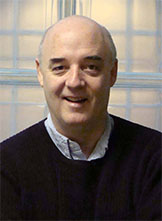 |
Patrick Moore, MD, MPH Department of Molecular Microbiology and Genetics, University of Pittsburgh Cancer Virology Program, Hillman Comprehensive Cancer Institute (United States) Presentation: Skin Cancers and Viruses: Lessons from Kaposi’s sarcoma and Merkel cell carcinoma
|
Patrick S. Moore, is the co-discoverer, together with Yuan Chang, of two of the seven known human cancer viruses: Kaposi’s sarcoma herpesvirus (KSHV/HHV8) and Merkel cell polyomavirus (MCPyV). Dr. Moore obtained his undergraduate degree from Westminster College in Utah. After graduate work at Stanford University in biophysical chemistry and a medical degree from the University of Utah, Dr. Moore joined the U.S. Centers for Disease Control where he trained as an Epidemic Intelligence Service officer, and worked in the Arboviral Disease Branch of the CDC. Following his work at the CDC, Dr. Moore completed a Preventive Medicine Residency, an MPH from the University of Berkeley, and became Deputy Commissioner/City Epidemiologist of the New York City Health Department. In 1993, he joined the faculty of the Columbia University School of Public Health. In 2002, Dr. Moore moved to the University of Pittsburgh where he holds a Distinguished Professorship in the Department of Molecular Microbiology and Genetics, and is the Director of the Cancer Virology Program at the Hillman Comprehensive Cancer Institute.
Dr. Moore is an elected member of the US National Academy of Sciences (2012), American Academy of Microbiology (2011), and the American Society of Clinical Investigation (2002). He has been the recipient of multiple honors including the Langmuir Prize (CDC – 1989), the Meyenburg Prize for Cancer Research (1997), the Robert Koch Prize for major advances in biomedical sciences (1998), the Charles S. Mott Prize of the General Motors Cancer Research Foundation (2003), and the American Cancer Society Research Professorship (2008).
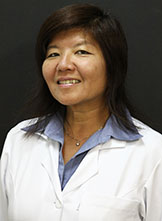 |
Valeria Aoki, MD, PhD Department of Dermatology, University of São Paulo (Brazil) Presentation: New Stories from the Pemphigus Family
|
Dr. Aoki was born and raised in São Paulo, Brazil. She graduated at the Department of Dermatology, University of São Paulo Medical School, Brazil, and attended the Dermatology Residency and the PhD programs of the same institution. As a Dermatology Foundation scholarship recipient, she then joined the Medical College of Wisconsin, USA for a post-doctoral fellowship in Immunodermatology at the Laboratory of Luis A. Diaz. Currently, she is a fulltime faculty member (Associate Professor) of the Department of Dermatology, University of São Paulo Medical School, Brazil, where her research laboratory is located. Her main research line include autoimmune blistering diseases (focus on endemic pemphigus foliaceus or Fogo Selvagem), and she has been a co-investigator of the Cooperative Group on Fogo Selvagem Research since 1992, in collaboration with the University of North Carolina at Chapel Hill, USA.
Positions and Honors
| 1987 | Graduated with honors, ranked third, Class of 1987, Univ. São Paulo Medical School, BR |
| 1988-1991 | Residency, Department of Dermatology, Univ. São Paulo Medical School, BR |
| 1992-1994 | Research Fellow, Department of Dermatology, Medical College of Wisconsin, USA* |
| 1994-1997 | Master Degree, Department of Dermatology, Univ. São Paulo Medical School, BR |
| 1997-1999 | PhD, Department of Dermatology, Univ. São Paulo Medical School, BR |
| 2000-2002 | Instructor, Department of Dermatology, Univ. São Paulo Medical School, BR |
| 2002-2012 | Assistant Professor, Department of Dermatology, Univ. São Paulo Medical School, BR |
| 2012-Present | Associate Professor, Department of Dermatology, Univ. São Paulo Medical School, BR (tenure track, degree with honors) |
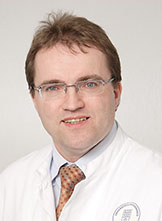 |
Matthias Augustin, MD University Medical Center Hamburg-Eppendorf (Germany) Presentation: How Do We Prove the Value of Dermatologic Care?
|
Since 2004 Prof. Augustin has a chair for health economics and for dermatology at the University Medical Center Hamburg-Eppendorf. Since 2010 he is founding director of the Institute for Health Services Research in Dermatology and Nursing as well as head of the Comprehensive Wound Center (CWC), chair of the Center for Dermatological Research (CeDeF) and chair of the German Center for Health Services Research in Dermatology (CVderm). Prof. Augustin is also a founding director of the Hamburg Institute for Health Economics (HCHE), the largest center in this discipline in Germany.
Furthermore, he has authored about 350 scientific articles and over 60 medical books. Prof. Augustin is a senior consultant to the German Ministry of Health, to several statutory health insurance companies and to a large number of companies in the health sector. He has been a spokesman at the German National Parliament (Bundestag), the Federal Joint Committee (GBA) and the Institute for Quality and Efficiency in Medicine (IQWiG).
Prof. Augustin founded the “Eppendorfer Dialog zur Gesundheitspolitik” (Eppendorf dialogue on health policy), a well-known biannual national meeting on current issues in health policy and health economics.
As a dermatologist and allergist, he holds more than two decades of clinical experience and is – in addition to the scientific activities – also still active in his own clinic.
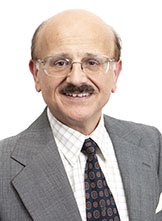 |
Rino Cerio, BSc (Hons), MBBS, FRCP (Lon), FRCP (Edin), FRCPath, ICDPath, DipRCPath Barts Health NHS Trust, The Institute of Cellular Molecular Science (School of Medicine and Dentistry) Queen Mary’s University of London (United Kingdom) Presentation: Updated Concepts and Dilemmas in Dermatopathology
|
Rino Cerio is a consultant dermatologist and senior clinician since 1991. To date he is the UK’s only Professor of Dermatopathology for Queen Mary’s University London Medical School and Dentistry. In 2008 he was appointed as Clinical Academic Director of Cutaneous Medicine and Surgery (Dermatology, Plastic Surgery including Trauma and Tissue viability) at Bart’s Health NHS Trust (incorporating St Bartholomew’s, Royal London, London Chest, Whipps Cross & Newham University Hospitals).
Prof. Cerio spearheads the tertiary referral skin tumour service. He teaches undergraduates and post-graduates on dermatological and dermatopathological topics locally, regionally, nationally and internationally. He was North Thames Deanery SpR trainee chairman over 6 years remaining educational supervisor. He instructs for DipClinDerm, ICDpath, ESDP, EADV, BSD, RCP, RCpath and BAD. As tutor for intercalated BSc in pathology tutor, he supervises interested research projects especially inflammatory dermatoses, demal dendrocytes and cutaneous oncology. These included MD theses in Dermatology and PhD in skin pathology. He examines for the University of London, DipClinDerm, the Royal College of Pathologists, DipRCPath, International Committee of Dermatopathology and UEMS. For 5 years he was co-founder and President of the European Society for Dermatopathology. In 2010-11 he was elected President for the section of Dermatology at The Royal Society of Medicine.
He has over 165 peer-reviewed publications, 5 books and 12 chapters including WHO classification text on SKIN TUMORS and the 6th, 7th and 9th editions of the “ROOK” book. He is currently on the editorial board of the American Journal of Dermatopathology, JEADV and Dermatopathology.
For nearly 30 years he remains a significant contributor to national and international dermatology and dermatopathology meetings.
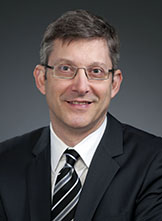 |
Jan Dutz, MD, FRCPC Department of Dermatology and Skin Science, University of British Columbia (Canada) Presentation: Using the Skin to Influence Systemic Immunity
|
Dr. Dutz is a Professor at UBC and a scientist with the Child and Family Research Institute and the Vancouver Coastal Health Research Institute. He received MD degree from Queen’s University. He continued with postgraduate training in Internal Medicine and Rheumatology (University of Toronto) and Dermatology (UBC).
Dr. Dutz has been the recipient of numerous honors and grants for research and investigation, and has co-authored over 50 scientific journal publications and 50 journal abstracts, as well as several chapters in books.
Dr. Dutz’s practice includes a Connective Tissue Disease clinic, and he is one of a few physicians in North America to be board certified and maintain active clinical interest in both Rheumatology and Dermatology. He has been awarded for his teaching and in the connections he brings to linking basic science discoveries and clinical dermatology. His current interests are skin immunization, melanoma, diabetes, and alopecia areata.
Dr. Dutz is the Coordinator of Resident Research for the UBC Department of Dermatology and Skin Science, and the focus of his laboratory has an independent laboratory is to study the skin immune system and its participation in autoimmune disease.
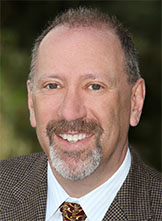 |
Richard L. Gallo, MD, PhD Division of Dermatology, University of California, San Diego (United States) Presentation: Recent Advances in Antimicrobial Peptides
|
Dr. Richard Gallo is Professor of Medicine and Pediatrics and Chief of Dermatology at University of California San Diego and the Chief of Dermatology at the VA San Diego Health System. He received his M.D. and Ph.D. from the University of Rochester, completed an internship in Pediatrics at Johns Hopkins Hospital and Dermatology residency and post-doctoral fellowship at Harvard Medical School.
Dr. Gallo’s research contributions have been fundamental to the understanding of skin immunology. His group discovered the existence of antimicrobial peptides in mammalian skin and was the first to show that antimicrobial peptides are essential for immune defense of mammals. His work has led to landmark observations that has changed understanding and treatment of several human diseases such as atopic dermatitis, psoriasis, rosacea and wound repair. He has published over 250 scientific papers, books and book chapters, including articles in many high profile scientific and medical journals. His scientific work is frequently seen in the press, including NBC nightly news, the BBC and the New York Times. He has been the recipient of numerous honors and awards including the top scientific awards for skin research in the US, Europe and Japan, and election to the American Society of Clinical Investigation and the Association of American Physicians. He is a frequent invited speaker at scientific and medical conferences and has lectured in 6 continents around the world.
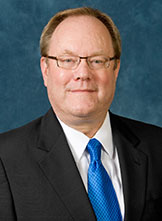 |
Timothy M. Johnson, MD Dermatology, University of Michigan (United States) Melanoma Sentinel Node Biopsy: Past, Present and Future in the New Era of Systemic Therapies
|
Dr. Tim Johnson is the Lewis and Lillian Becker Professor at the University of Michigan. He received his medical degree and dermatology residency training at the University of Texas at Houston. After completing fellowship training in cutaneous surgery and oncology at both the University of Michigan and University of Oregon, he joined the Michigan faculty in 1990 with appointments in Dermatology, Otolaryngology and Surgery. He has served as clinical director of the Comprehensive Cancer Center Multidisciplinary Melanoma and Cutaneous Oncology Programs since 1990.
He has received many clinical, teaching, and research honors; delivered numerous national and international keynote and named lectureships over the last two decades; and is a benchmark for clinical care. He served on the board of directors and executive committees of several national and international organizations that impact dermatology, melanoma and non-melanoma skin cancer. He was an invited founding member of the National Comprehensive Cancer Network Guideline Committees for Skin Cancer and serves on the American Joint Committee on Cancer Staging.
He is an investigator on grants, clinical trials, and numerous research activities. He established robust tissue banks in non-melanoma and melanoma with linkable comprehensive clinical databases. His research is focused on integration of data and specimens with experimental models to identify molecular mechanisms of disease; as well as development of evidence-based strategies for better treatment. His publication portfolio includes over 200 original peer-reviewed publications and 25 chapters published in mainstream dermatology, surgery, and oncology journals; including top impact journals such as Nature, Nature Medicine, Journal of Clinical Oncology, Cancer Research, Nature Cell Biology, and JAMA. Dr. Johnson practices medicine exclusively at the University of Michigan, where he is an internationally acclaimed leader in dermatology; and more specifically, cutaneous oncology.
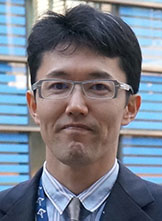 |
Kenji Kabashima, MD, PhD Department of Dermatology, Kyoto University Graduate School of Medicine (Japan) Presentation: Multiphoton Skin Imaging
|
Kenji Kabashima was brought up in northern part of Kyushu in Japan. He graduated from Kyoto University in 1996. He trained in Medicine/Dermatology at the United Naval Hospital, Kyoto University Hospital, and University of Washington Medical Center. Then he started research on lipid mediators in immunology at Kyoto University, which led to a PhD (Prof. Shuh Narumiya). That year, he was appointed as assistant professor in Dermatology at Kyoto University (Prof. Yoshiki Miyachi), and then he researched on dendritic cell homeostasis and plasma cell mobilization at UCSF (Prof. Jason Cyster). In 2005, he moved to University of Occupational and Environmental Health as an associate professor (Prof. Yoshiki Tokura). Since 2008, he has been researching on the mechanism of inflammatory skin diseases by gene-targeted mice and visualization of the skin at Kyoto University.
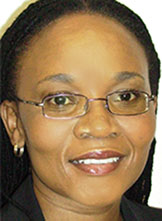 |
Nonhlanhla P. Khumalo, MBChB, FCDerm, PhD Department of Medicine, University of Cape Town (South Africa) Presentation: Hair Disorders and Ethnicity
|
Dr. Khumalo graduated with a Bachelor of Medicine and Surgery in 1990; she initially worked as a general practitioner and later half-time for 10 years whilst raising her daughters. She received clinical and research training in dermatology at Groote Schuur Hospital and 3 years at The Churchill Hospital in Oxford, registering as a Fellow of the SA College of Dermatologists in 2003. In addition to clinical dermatology, she is trained in epidemiology, the conduct of systematic reviews (of healthcare interventions), has laboratory experience in performing immunoflourescence for immunobullous diseases and electron microscopy of hair. Whilst in the UK she was the first author of the systemic review and later was invited to be a member of the committee that drafted the 2000 British Association of Dermatologists’ Guidelines for the Management of Bullous Pemphigoid. She was appointed as a consultant dermatologist in 2008 and ran the Paediatric Dermatology Service at Red Cross Children’s Hospital for 5 years. Her academic interests include evidence based clinical dermatology, but her passion is the study of the causes and treatments of hair loss.
Dr. Khumalo moves comfortably from the bedside to the laboratory in her use of clinical and basic science research tools. She was recipient of the inaugural Discovery Foundation (SA) Research Fellowship Award and graduated in 2007 with a PhD in Public Health (University of Cape Town). She received ad hominum promotion to the rank of Associate Professor in 2009 and was appointed Head of Dermatology at UCT in December 2012. She has published more than 50 journal manuscripts, three book chapters, is founding editor of the SA Journal of Child Health and author of “Genes for Teens”, a science-made-relevant-to-daily-life book that aims to inform and motivate teenagers to think before they act.
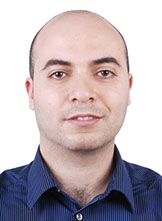 |
Mazen Kurban, MD Department of Dermatology, Biochemistry & Molecular Genetics, American University of Beirut Medical Centre (Lebanon) Presentation: Insights from Genetic Hair and Nail Disorders
|
Dr. Kurban is a MD graduate of class-2004 and member of the Alpha Omega Alpha as of 2004. Between 2008 and 2011, Dr. Kurban worked at Columbia University Medical Center in a human genetics laboratory with Dr. Angela Christiano in basic science research related to genodermatoses. Between 2009 and 2011, Dr. Kurban completed a fellowship in clinical molecular genetics at Columbia University Medical Center and, as of September 1, 2011, Dr. Kurban is American board certified in clinical molecular genetics.
Dr. Kurban is also a member in several societies including: Society of Investigative Dermatology, Japanese Society of Investigative Dermatology and the American Society of Investigative Dermatology. Dr. Kurban is a well-read and most up-to-date clinician and molecular geneticist who is highly competent in rendering expert opinion in his fields of interest. To date, Dr. Kurban has participated in more than 45 publications in reputable and prestigious peer-reviewed dermatology and genetics journals.
Dr. Kurban plans to initiate a genodermatoses unit at his department at AUBMC and with his joint position in the Department of Biochemistry and Molecular Genetics, aims to work on identifying new genes implicated in the pathogenesis of various genodermatoses for which the pathogenesis is yet undetermined.
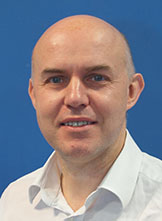 |
John McGrath, MD, FRCP, FMedSci St John’s Institute of Dermatology, King’s College London (United Kingdom) Presentation: Exciting Discoveries in Genodermatoses
|
John McGrath is Professor of Molecular Dermatology at King’s College London and Head of the Genetic Skin Disease Unit, as well as Honorary Consultant Dermatologist at St John’s Institute of Dermatology, the Guy’s and St Thomas’ NHS Foundation Trust in London, and Honorary Professor of Dermatology at the University of Dundee.
He was born in 1962 and grew up in England, Japan and Australia. He qualified in Medicine at Guy’s Hospital (London) in 1985. He then trained in dermatology at St John’s Institute in London and did post-doctoral work in Jefferson Medical College in Philadelphia. In 1996, he was appointed Senior Lecturer at St John’s and became full Professor of Molecular Dermatology in 2000. He was Visiting Professor to Osaka University in 2010. He is a former Board member of the European Society for Dermatological Research and was the Society’s President in 2007-8.
His awards include the 2008 Sulzberger Lecture, the 2010 Dohi Memorial Lecture, the 2011 Montagna Lecture, the 2012 Tanioku-Kihei Lecture, and the 2013 Cormane Lecture. In 2011 he was elected to the UK National Academy of Medical Sciences and in 2012 he was awarded the Fothergill Gold Medal by the London Medical Society. He is a former editor of the journal Clinical and Experimental Dermatology and was recently the Section Editor of Genetics and Deputy Editor for the Journal of Investigative Dermatology. His main research interests involve the molecular biology and pathology of inherited skin diseases, especially epidermolysis bullosa. His professional goals are to unravel the mysteries of human genetic skin diseases and to translate some of the benefits of genetic research into clinical improvements for patients, especially through clinical trials of novel therapies.
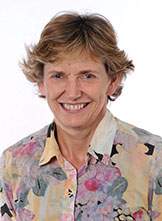 |
Rosemary Nixon, MBBS, FACD, FAFOEM, MPH Occupational Dermatology Research and Education Centre (Australia) Presentation: The World of Contact Dermatitis in 2015
|
Rosemary Nixon is the only person to have attained Australian specialist qualifications in both dermatology and occupational medicine. She has an interest in occupational dermatology and contact dermatitis. She started the Contact Dermatitis Clinic at the Skin and Cancer Foundation Victoria in 1987 and the Occupational Dermatology Clinic in 1993 initially at Monash Medical Centre. She has patch tested over 4500 patients and is currently based at the Skin and Cancer Foundation Inc, Melbourne, Australia.
Her qualifications include BSc (Hons) in 1978, MB BS in 1981, Fellowship of the Australasian College of Dermatologists (FACD) in 1988, Fellowship of the Faculty of Occupational and Environmental Medicine (FAFOEM) (RACP) in 1994 and MPH (Master of Public Health) in 1996.
In 2001, she established a small research group in occupational dermatology at the Skin and Cancer Foundation, the Occupational Dermatology Research and Education Centre (ODREC) (www.occderm.asn.au).
She has a number of research interests in occupational dermatology and has authored over 100 scientific papers. She is the spokesperson for the Australasian College of Dermatologists on issues relating to contact dermatitis and has had numerous professional roles within the College, including as an examiner and as Chair of the Victorian Faculty.
In April 2008, she was selected as the winner of the prestigious Jan Wahlberg prize in contact dermatitis for best paper submitted to the European Society of Contact Dermatitis biennial meeting. In 2009 she was named by the International Research Promotion Council (IRPC) to be “Eminent Scientist of the Year in Dermatology and Occupational Health” and was appointed to the prestigious International Contact Dermatitis Research Group, the peak body worldwide for contact dermatitis. In 2010, she was appointed as Associate Professor, Monash University and in 2012, she was appointed as Honorary Clinical Associate Professor at the University of Melbourne.
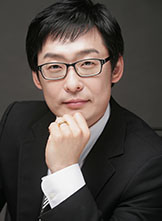 |
Kyle Koo-Il Seo, MD, PhD Department of Dermatology, Seoul National University Hospital (South Korea) Presentation: What’s Hot in Cosmetic Dermatology?
|
Kyle Koo-Il Seo is Clinical Associate Professor (in charge of Botox clinic) at the Department of Dermatology, Seoul National University Hospital, Seoul, Korea. He is also Director of the Modelo Clinic located in Seoul, Korea, since 2001.
Dr. Seo obtained his MD in 1990 from the Seoul National University College of Medicine, Seoul, Korea. Subsequently, he completed his 5-year residency and 2-year fellowship at the Department of Dermatology of the Seoul National University Hospital, Seoul, Korea, and obtained his PhD from the same university in 2000. In 2000, he was a research scientist at the Department of Dermatology, Graduate School of Medicine and Faculty of Medicine, The University of Tokyo, Tokyo, Japan. In 2001, he opened Modelo Clinic and in 2002, he took up his current position at the Seoul National University Hospital, Seoul, Korea.
Dr. Seo is widely-recognized as a leader of botulinum toxin and filler. His extensive experience provides him many opportunities to lecture on the subject of botulinum toxin and filler at numerous international meetings. A keen researcher, Dr. Seo has published extensively in numerous peer-reviewed journals including Dermatology, Dermatologic Surgery, Clinical and Experimental Dermatology, Journal of Dermatology, and Contact Dermatitis, to name a few. Recently, he also contributed ‘nose’ chapter in “soft tissue augmentation” and ‘neuronox’ chapter in “botulinum toxin”, which are one of famous series, ‘Procedures in Cosmetic Dermatology’ (Carruthers J, Carruthers A (eds) 3rd ed. 2012 Elsevier, Philadelphia).
Dr. Seo is an active member of several national and international professional bodies. Currently, he is a member of the Korean Society of Dermatology, International Society for Dermatologic Surgery (ISDS), and American Board of Hair Restoration Surgery.
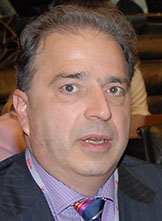 |
Mihael Skerlev, MD, PhD Department of Dermatology and Venereology, Zagreb University School of Medicine and Zagreb University Hospital (Croatia) Presentation: Sexually Transmitted Infections: Important Global Trends
|
Prof. Mihael Skerlev was born in Zagreb, Croatia, on February 20, 1958.
His present position is attending dermatovenereologist and Professor of Dermatology and Venereology, Medical School, Zagreb University, Croatia working as a head of the Reference Laboratory of the Ministry of Health and Social Welfare of Republic of Croatia for Dermatological Mycology and Parasitology (Mycologic Laboratory) and the STD Out-patients Clinic. D. Sc. (PhD) – Dermatology and Venereology (1998): “The DNA types of Human Papillomavirus in genital skin lesions of men”. Board certified in Dermatology and Venereology in 1990 (Zagreb, Croatia). His field of work and special interest are: dermatologic mycology, STD, HIV-infection and paediatric dermatology.
Prof. Skerlev spent 4 months at the Department of Dermatology on Harvard University mostly with Prof. J.S. Dover and Dr. R.A. Johnson. Prof. Skerlev is the member of the Croatian Dermatovenereological Society, of the American Academy of Dermatology (non-resident fellow), and he has been appointed the President (2005-2008) and, respectively, Vice-President (2009 on) of the Croatian Dermatovenereological Society and founding member and President of the Croatian STD Society, European Board member of the IUSTI (International Union for Sexually Transmitted Infections), the member of the IUSTI World Executive Committee (since 2011) and the Board member of the Alpe- Danube-Adria- STD Society; He is also the member of the EADV, member of the Editorial Board of the International Journal of Dermatology, and the Honorary member of the German and Hungarian STD Societies and the Macedonian, Serbian and Jordanian Dermatovenereological Societies. He speaks fluently English, French, Italian and Modern Greek.
Prof. Skerlev has been several times awarded the Dean’s prize for the best students’ scientific paper. On the year 2007, and 2012 respectively, Prof. Skerlev was awarded special IUSTI Silver medal and diploma for “outstanding contributions in promoting the international activities in the fight against sexually transmitted infections”. Prof. Skerlev has presented more than 150 papers on different international Congresses, mostly as invited speaker on STD (mostly HPV) and Dermatomycology, has chaired different sessions and has been member of the international organizing and scientific committees worldwide. Prof. Skerlev had been appointed the President of the International Symposium on Dermatomycology (Dubrovnik, Croatia, 2000), President of the 3rd Congress of the Croatian Dermatovenereologists with international participation (Split, Croatia, May 18-21, 2006), President of the 23rd IUSTI Europe Conference on STIs and HIV/AIDS held in Cavtat/Dubrovnik, Croatia, October 11-14, 2007, the co-ordinator (together with Prof. Gross) of the EADV HPV-genital infections Task Force. He has been also appointed the member of the Advisory Board of the MSD for quadrivalent HPV vaccine and the principal investigator for Croatia.
Prof. Skerlev has published about 100 papers (mostly in Journals referred in Index Medicus and Current Contents), and has authored and co-authored many different chapters in domestic and international textbooks including Fitzpatrick’s Textbook Dermatology in General Medicine.
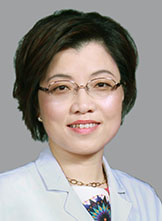 |
Leihong (Flora) Xiang, MD, PhD Huashan Hospital, Shanghai Medical College, Fudan University (China) Presentation: What’s New in Vitiligo
|
Dr. Flora Xiang is currently Clinical Professor and Deputy Chair, Department of Dermatology, Huashan Hospital, Deputy Chair of Institute of Dermatology, Shanghai Medical College, Fudan University. She got her MD, PhD at Shanghai Medical University in 1992 and in 1999, respectively. During 2001-2002, she was an honorary research associate in the division of Dermatology, Department of Medicine, Queen Mary Hospital, The University of Hong Kong. In 2005, she was a clinical observer in the Department of Dermatology, Harvard Medical School in Boston, as Huashan Hospital is a sister hospital to MGH.
She has memberships in professional societies – as a committee member in Dermatology Society, China Medical Association; Secretary in general and board committee member in the China Dermatology Association (CDA), Deputy Chair in Minimally invasive plastic surgery and dermatology association (MIPSD), Vice Director of Acne research group in Dermatology Society, Chinese Integrated Traditional Medicine and Western Medicine Association. She is also an international member of EADV, Member of Asian Association of Dermatology and Venerology (AADV), Member of Asian Acne Board (AAB) and member of Asian Society of Pigment Cell Research (ASPCR).
Her focus of interest and research is pigmentary skin disorders and cosmetic dermatology. She has lectured at the Mayo Clinic, University of Pennsylvania, Boston University, University Hospitals of Cleveland, New York Presbyterian Hospital Cornell University, Hammersmith Hospital, London, UK on those topics. Her research project “the experimental and clinical study of pure cultured melanocytes autologous and allograft in the treatment of vitiligo” achieved Shanghai Municipal Science and Technology Achievement Awards (No. 004710, 2000) and National Department of Health Science and Technology Achievement (No. 360- 01-20710808-02, 2001). Dr. Xiang has published over 65 articles and 11 book chapters. She is the principal investigator of five research projects, supported by the National Science Fund Committee (NSFC) and National Department of Education, etc.
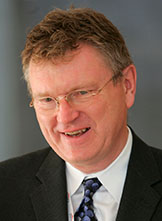 |
Christopher B. Zachary, MBBS, FRCP Department of Dermatology, School of Medicine, University of California-Irvine (United States) Presentation: New Surgical Concepts that Every Dermatologist Needs to Know
|
Christopher B. Zachary, MBBS, FRCP, is Professor and Chair of the Department of Dermatology at the University of California, School of Medicine in Irvine (UCI), and Director of Clinical Operations.
Dr. Zachary received his medical degree from the Royal Free Hospital, University of London, completed his dermatology residency at St John’s Hospital, Institute of Dermatology, University of London, and his fellowship in cutaneous surgery at the Department of Dermatology, University of Michigan in Ann Arbor.
A dermatologic surgeon specializing in cutaneous oncology and reconstruction, Dr. Zachary is a recognized expert in the treatment of skin cancer. He pioneered microscopic detection of skin cancer by rapid immunocytochemistry in frozen sections and, with his colleague, Dr. Sergei Grando, he cultured the first “immortal” basal cell cancer cell lines.
Dr. Zachary has published numerous peer-reviewed articles, chapters, and books on surgery of the skin. He is often invited as a featured speaker at national and international symposia, and is a regular contributor to academic meetings both in the United States and abroad. His interest and expertise in laser surgery has led to considerable industry-supported research in optimal laser systems for cutaneous laser surgery.
Dr. Zachary has received many awards and honors, most recently the ASDS Teaching Award for Excellence, and the Leon Goldman Memorial Award from the American Society for Laser Medicine and Surgery. He has also been a regularly featured physician in Best Doctors in America. Dr Zachary, an innovator in educational programs for training physicians, founded both www.MDlive.net and www.lasernews.net, and co-founded www.cme.md.
| Adriene Lee Department of Dermatology, St Vincent’s Hospital, Melbourne, Australia Presentation: The World of Contact Dermatitis in 2015
|
Dr Adriene Lee graduated in Medicine from the University of New South Wales, Australia with first class honours in 1996. She completed her dermatology specialist training in Victoria in 2005 during which time she was awarded the Roche Travelling Scholarship spending 12 months at St John’s Institute of Dermatology in London. She was awarded the Australasian College of Dermatologists Travelling Fellowship in 2004 for the most meritorious performance in the fellowship examinations. In 2005, she was awarded the F.C. Florance Bequest and the Paul Eddington Scholarship to further her experience in occupational contact dermatitis.
She currently has appointments at St Vincent’s Health and Monash Health in Melbourne, and conducts a contact dermatitis clinic at Monash Health. She was the Director of Training for Dermatology in Victoria for the last 3 years and is currently a member of the National Education Committee and Chair of the National Training Committee, both of the Australasian College of Dermatologists.

